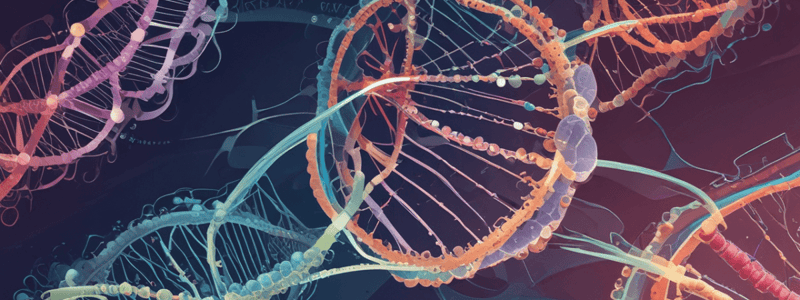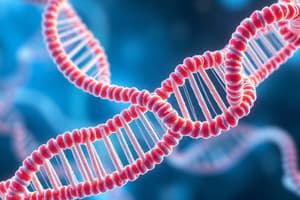Podcast
Questions and Answers
What causes RNA polymerase to stop transcribing and dissociate from the DNA template?
What causes RNA polymerase to stop transcribing and dissociate from the DNA template?
- A promotor
- A primase
- A helicase
- A terminator (correct)
Which type of terminator requires the Rho protein to function?
Which type of terminator requires the Rho protein to function?
- Rho-independent terminator
- Rho-suppressive terminator
- Rho-dependent terminator (correct)
- Rho-enhanced terminator
What is the primary activity of the Rho protein during termination?
What is the primary activity of the Rho protein during termination?
- Polymerase activity
- Ligase activity
- Helicase activity (correct)
- Synthase activity
Which characteristic is typical of a Rho-independent terminator?
Which characteristic is typical of a Rho-independent terminator?
Which stage of RNA synthesis immediately precedes termination?
Which stage of RNA synthesis immediately precedes termination?
How does the Hot Pursuit model describe the function of Rho during termination?
How does the Hot Pursuit model describe the function of Rho during termination?
Which subunit of the E. coli RNA polymerase is responsible for the initiation of transcription?
Which subunit of the E. coli RNA polymerase is responsible for the initiation of transcription?
What is the function of the β' subunit in E. coli RNA polymerase?
What is the function of the β' subunit in E. coli RNA polymerase?
Which of the following sequences is known as the Pribnow box in E. coli promoters?
Which of the following sequences is known as the Pribnow box in E. coli promoters?
Which of the following steps occurs first during the initiation of transcription in E. coli?
Which of the following steps occurs first during the initiation of transcription in E. coli?
What happens after the σ factor is released during the transcription process in E. coli?
What happens after the σ factor is released during the transcription process in E. coli?
How is the transcription initiation site designated in a transcription unit?
How is the transcription initiation site designated in a transcription unit?
What is the main function of RNA polymerase in transcription?
What is the main function of RNA polymerase in transcription?
Which structure is responsible for carrying out translation?
Which structure is responsible for carrying out translation?
In what direction does RNA polymerase synthesize the RNA molecule?
In what direction does RNA polymerase synthesize the RNA molecule?
What unwinds the DNA during transcription?
What unwinds the DNA during transcription?
During which stage of transcription does RNA polymerase begin synthesizing RNA?
During which stage of transcription does RNA polymerase begin synthesizing RNA?
Which steps are involved in the stages of transcription?
Which steps are involved in the stages of transcription?
What is a key difference between transcription and DNA replication?
What is a key difference between transcription and DNA replication?
Which of the following is a similarity between transcription and DNA replication?
Which of the following is a similarity between transcription and DNA replication?
Flashcards are hidden until you start studying
Study Notes
Termination of Transcription
- RNA polymerase transcribes until it meets a terminator, then transcription stops and the RNA product dissociates from the DNA template.
- Many terminators are hairpin forming sequences.
- Termination signals in E. coli:
- Rho-dependent terminators: require a protein factor (Rho)
- Rho-independent terminators: do not require Rho
Rho-dependent Termination
- Rho Factor:
- 46-kD protein, active as a hexamer
- Binds to RNA
- Has helicase activity, causing RNA-DNA to separate
- Hot pursuit model: Rho binds to RNA tail and moves along transcript until it catches the polymerase
Rho-independent Termination
- Rho-independent terminator:
- G-C rich stem
- U-DNA pairing is very weak, allowing dissociation
- U-run: 7-9 bases after loop
Central Dogma
- Describes the flow of genetic information from DNA to RNA to protein
- Transcription, translation, and degradation of mRNA molecules often occur simultaneously in prokaryotes
Transcription
- Process by which a DNA sequence is copied into an RNA molecule
- RNA polymerase synthesizes the RNA molecule in the 5' to 3' direction using one of the DNA strands as a template
Stages of Transcription
- Initiation: RNA polymerase binds to the promoter region and begins to unzip the DNA strands
- Elongation: RNA polymerase synthesizes the RNA molecule in the 5' to 3' direction using one of the DNA strands as a template
- Termination: RNA polymerase reaches the terminator sequence and stops transcribing the DNA
Differences Between Transcription and DNA Replication
- Transcription produces an RNA molecule, while DNA replication produces a DNA molecule
- Transcription is carried out by RNA polymerase, while DNA replication is carried out by DNA polymerase
- Transcription only requires one strand of DNA as a template, while DNA replication requires both strands of DNA as a template
E.Coli RNA Polymerase
- Core enzyme: α₂ β β' ω
- Holoenzyme: α₂ β β' ωσ
- Functions of the subunits:
- α: assembly of the tetrameric core
- β: ribonucleoside triphosphate binding site
- β': DNA template binding region
- σ: initiation of transcription
Numbering of a Transcription Unit
- Transcript initiation site is +1
- Bases preceding the initiation site are given minus (-) prefixes and are referred to as upstream sequences
- Bases following the initiation site are given plus (+) prefixes and are referred to as downstream sequences
Promoters
- In E. coli, must be >12 bp to avoid occurrence by chance
- Promoters have only small conservation in sequence
- Four main regions:
- Startpoint
- -10 sequence (Pribnow box)
- -35 sequence
- 17 nucleotide spacer sequence between -10 and -35 sequences
Starting Transcription
- Binding of RNA polymerase holoenzyme to a promoter region in DNA
- Localized unwinding of both DNA strands by RNA polymerase to provide a single-stranded template
- Formation of phosphodiester bonds between the first few ribonucleotides in the nascent RNA chain
- Conformational change in enzyme, promoter is cleared
- Sigma Factor is released
- Nus A protein binds instead, ready for elongation "antitermination complex"
Elongation
- RNA polymerase is bound to DNA and is covalently extending the RNA chain
- The polymerase moves downstream from its position, processively extending the nascent RNA chain
Studying That Suits You
Use AI to generate personalized quizzes and flashcards to suit your learning preferences.




